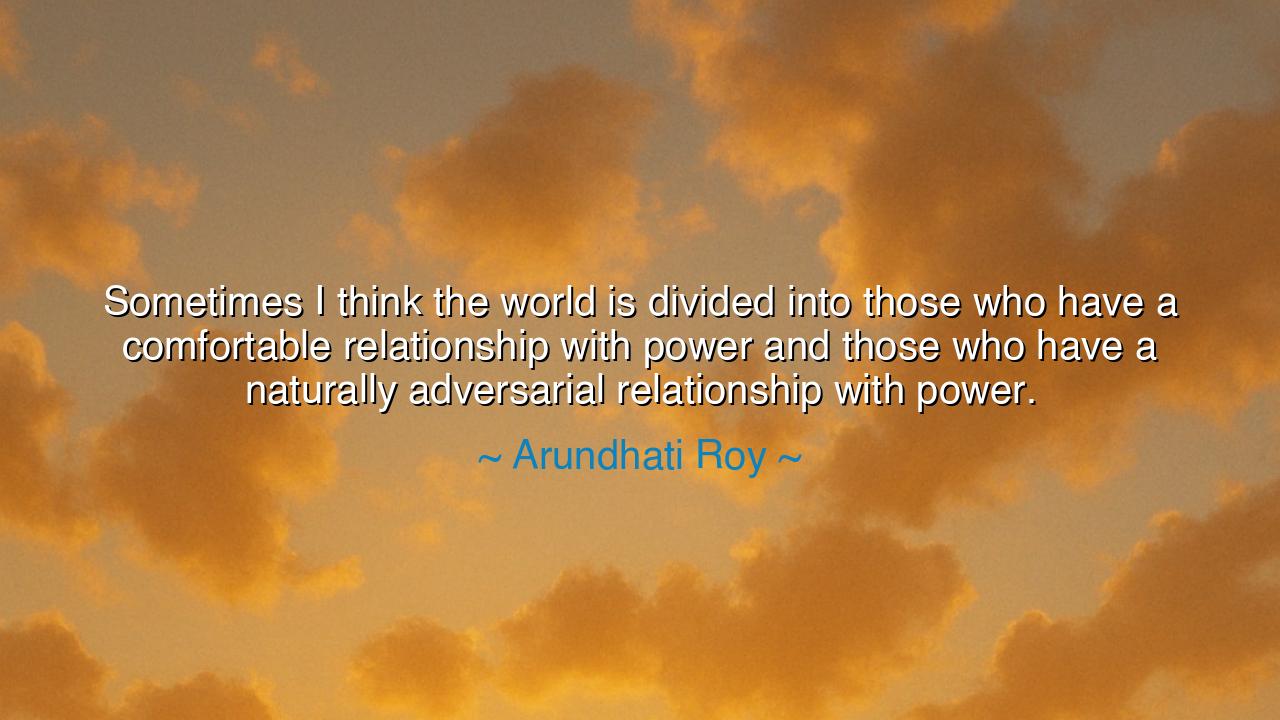
Sometimes I think the world is divided into those who have a
Sometimes I think the world is divided into those who have a comfortable relationship with power and those who have a naturally adversarial relationship with power.






The writer and truth-seeker Arundhati Roy once declared: “Sometimes I think the world is divided into those who have a comfortable relationship with power and those who have a naturally adversarial relationship with power.” In this utterance she unveils a truth as ancient as kingdoms: that mankind does not meet power in the same spirit. Some bend easily toward it, finding harmony in its presence, while others rise in resistance, as though born to stand against its weight.
A comfortable relationship with power belongs to those who see authority as a friend, a guide, or even a protector. They move within its sphere without fear, adapting themselves to its currents, and in return, they are carried along by its favor. For such souls, the structures of power feel natural, even necessary, and they do not question its right to rule.
Yet there are others—those with a naturally adversarial relationship with power. To them, authority is not a gentle hand but a looming shadow. They are restless under command, suspicious of control, ever questioning the motives of rulers. These souls are like the prophets of old, who spoke against kings, or the rebels who challenged empires. Their spirit will not yield, for they see in power the seed of corruption and the peril of injustice.
Roy’s words reveal that this division is not merely of choice, but of nature itself. Some hearts incline toward obedience, while others burn with defiance. This eternal contrast shapes the destinies of nations, for history is the story of the dance between those who embrace power and those who resist it.
So let this wisdom endure: know thyself, and know how thy spirit stands with power. For whether in comfort or in conflict, each stance carries its burden. And remember always, that the measure of true justice is not found in submission or rebellion alone, but in discerning when power must be trusted, and when it must be challenged.






DTDuoc Tran
Roy’s quote brings up an important point about how power shapes people’s behaviors and perspectives. It’s fascinating to think about how some people embrace power while others are naturally opposed to it. But what happens when the balance of power shifts? Do those who are adversarial to power eventually take on positions of power themselves, or do they remain resistive throughout their lives? How does one’s relationship with power evolve over time?
TTNgo Thanh Thuy
Arundhati Roy’s distinction between those who are comfortable with power and those who resist it is so thought-provoking. But I wonder, does this division always hold true in every situation? Some people may feel comfortable with power in their personal lives but challenge it in larger social contexts. How do we reconcile the fact that our relationship with power might change depending on the scale or nature of the power involved?
LLe
I can’t help but think that this quote touches on something fundamental about human nature—our response to power. Some of us accept and even seek it, while others inherently distrust it. But does that mean there’s a moral high ground for those who oppose power, or are they simply reacting to injustice? Can both perspectives be valid depending on the circumstances, or is there an ideal way to engage with power?
NDDieu Vy Nguyen Do
Arundhati Roy raises an interesting point about the way power divides people. On one side, you have those who seem to thrive in power dynamics, and on the other, you have those who are constantly pushing back. But is it possible for someone to change their relationship with power over time? Can life experiences or a shift in perspective make someone go from being adversarial to comfortable with power, or vice versa?
BYBui yvi
This quote really resonates with me, especially in the context of social and political movements. It seems like there’s always a struggle between those who hold power and those who are resisting it. But why is it that some people are naturally inclined to resist power while others embrace it? Is it a matter of personal experiences, or do societal structures shape these attitudes? How can we better understand where we fit in this divide?